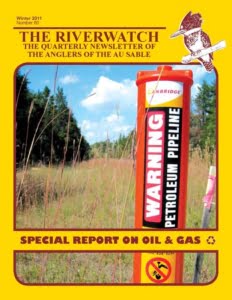Michigan Trout Unlimited opposes the exploration, development, production and remediation of contamination that could have a negative impact on coldwater fisheries and their watersheds unless and until appropriate safeguards are in place to protect those fisheries and their watersheds from potential damage.
Fracking, also known as hydraulic fracturing, is a controversial method of extracting natural gas and oil from shale rock formations. In Michigan, citizens who are concerned about the environmental and health impacts of fracking can take the following actions:
- Educate yourself: Learn about the process of fracking, its potential risks and benefits, and how it could impact your community. Resources such as the Michigan Department of Environmental Quality can provide information on the state’s regulation and policies on fracking.
- Contact your elected representatives: Write letters or emails, call, or meet with your elected officials to express your concerns and ask them to take action to address the issue. You can also attend town hall meetings and other public events to raise awareness of the issue and build community support.
- Join or support local organizations: Find and join local organizations that are working to raise awareness about the impacts of fracking on the environment and public health. These groups often organize rallies, petitions, and other actions to advocate for change.
- Advocate for stricter regulations: Lobby for stronger regulations to protect public health and the environment, including more rigorous testing and monitoring of water and air quality, and stricter rules for waste disposal and treatment.
- Participate in public hearings: Attend public hearings and speak out against fracking projects that could harm your community. You can also submit written comments to regulatory agencies during the comment period.
- Reduce your own energy consumption: Reducing your own energy consumption through conservation measures such as turning off lights, driving less, and using energy-efficient appliances can help reduce the demand for fossil fuels and ultimately reduce the need for fracking.
The RIVERWATCH, a Special Report on Oil & Gas
In 2010, Anglers of the Au Sable hired Jeff Alexander, an investigative journalist and author of Pandora’s Locks, to look into the state of the oil and gas industry in Michigan and its affect on our woods and streams. The project was packaged in Anglers newsletter, The RIVERWATCH, as a Special Report on Oil & Gas. It was released in mid February.
Alexander’s investigation looked at two areas, the first is the spider web of pipelines that lace through some of our most beloved watersheds and the potential threats they may contain, with a focus on the AuSable River watershed . The second area in the report is the burgeoning effect of the water intensive technique of drilling for oil and natural gas of horizontal fracking to Northern Michigan. For the neophyte, it is a comprehensive introduction to the threat of oil and gas exploration and recovery to Michigan’s wild places. To those more conversant with the problem, the report will expand their knowledge base and help focus their concerns for the future.
If you care about coldwater conservation in our state this is a must read!


